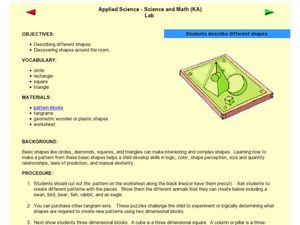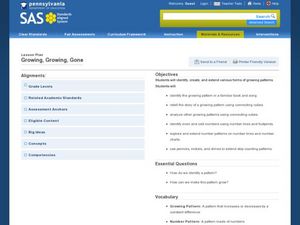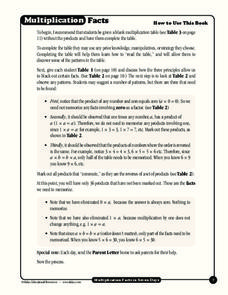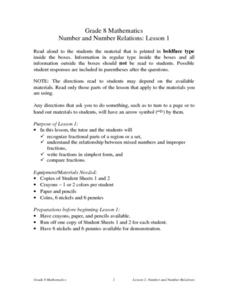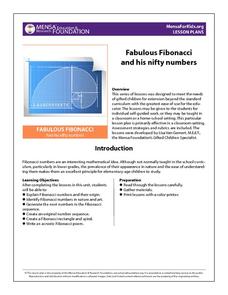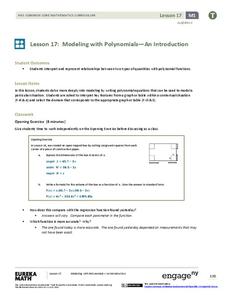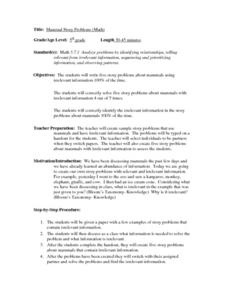Curated OER
Problem Solving: Patterns in the Coordinate Grid
Coordinate graphs can be used for a variety of purposes. In this basic instructional activity on coordinate graphing, 4th graders learn how to identify points and patterns on a graph. This instructional activity could be used as a follow...
Curated OER
Applied Science - Science and Math (K) Lab
In this shape lesson, learners cut out tangram shapes and create different pictures with them. They look at 3-D shapes as well. There is a nice, hands-on component built into this lesson.
Virginia Department of Education
Scientific Notation
Writing a number is all in the notation. The resource introduces the class to scientific notation. Pupils learn the process of taking a very large or small number in standard form and write it in scientific notation. To practice,...
Curated OER
What's in the Bag?
Help your young scholars identify the attributes of two-dimensional shapes. They read the book Round is a Mooncake, and use pattern blocks to sort shapes. Students sort shapes according to their attributes.
Curated OER
Halloween Patterns
In this identifying patterns instructional activity, students cut out pictures, view Halloween picture patterns, determine the last pattern, and paste the cut out pattern in its correct pattern group. Students paste 4 answers.
Curated OER
Numbers in Nature
Students identify numbers in nature. For this algebra lesson, students solve problems using Fibonacci sequence as it is expressed in nature. They research the Fibonacci's pattern as it relates to numbers.
Curated OER
Patterns in the Sums of Polygon Angles
Sixth graders discover the patterns of sums of polygon angles. In this math lesson plan, 6th graders study the properties of geometric shapes to solve problems as they participate in hands-on activities.
Curated OER
Growing, Growing, Gone
Budding mathematicians identify growing patterns in numbers and songs then create their own patterns. They look at number patterns and language patterns and then create their own using money and footprints.
Curated OER
Look for Patterns: Quilts in Two Faith Ringgold Stories
Author Faith Ringgold uses quilts to illustrate her books Tar Beach and Aunt Harriet's Underground Railroad. In this integrated trio of activities, young scholars read stories, identify and create patterns, and design quilt squares of...
Didax
Multiplication Facts
Learning their multiplication facts is a big step in the education of young mathematicians. Help achieve this goal with the support of this collection of instructional materials.
Curated OER
Number and Number Relations: Lesson 1
In a detailed format, this plan walks learners through an introduction to place value. They explore place value words and concepts and recognize patterns in the number system. Students identify a number when given a number word. They use...
MENSA Education & Research Foundation
Fabulous Fibonacci and His Nifty Numbers
Fibonacci numbers are not only found in the classroom but also in nature. Explore the concept of Fibonacci numbers through a series of lessons designed to gain insight into the mathematical reasoning behind the number pattern, and spark...
EngageNY
Graphing Quadratic Functions from Factored Form
How do you graph a quadratic function efficiently? Explore graphing quadratic functions by writing in intercept form with a lesson that makes a strong connection to the symmetry of the graph and its key features before individuals write...
EngageNY
Modeling with Polynomials—An Introduction (part 2)
Linear, quadratic, and now cubic functions can model real-life patterns. High schoolers create cubic regression equations to model different scenarios. They then use the regression equations to make predictions.
Curated OER
Patterns in Pascal's Triangle
Students examine the patterns that exist in Pascal's Triangle. They explore multiples and factors. Sudents use an applet to create and color the multiples in Pascal's Triangle.
Curated OER
Patterns to the Rescue
Students watch "Cyberchase: The Poddleville Case" and analyze patterns. They complete a patterns assignment worksheet and then they make up patterns using numbers, shapes or colors, for their classmates to solve. They use patterns to...
Curated OER
Identifying Patterns
Students investigate the elements of a pattern. In this geometry instructional activity, students identify different shapes in a pattern and discover which shapes are missing in order to extend it. Students create their own patterns...
Curated OER
Create and Analyze Rectangular Patterns
Students explore the concept of geometric patterns. In this geometric pattern lesson, students use Microsoft Excel to explore geometric patterns. Students analyze growth rates of pattern growth. Students create their own patterns and...
Curated OER
Finding Remainders in Pascal's Triangle
Learners use clock arithmetic to find remainders. In this patterns in math lesson, students explore the relationship between clock arithmetic and remainders using a computer applet. Learners also identify patterns in Pascal's triangle...
Curated OER
Continue the Pattern
First graders read a book about patterns and then practice reproducing patterns. In this pattern lesson plan, 1st graders continue patterns that are already established by using manipulatives.
Curated OER
Patterns
Fifth graders investigate the use of patterns in a data set. The set is disolayed visually using cubes. This helps struggling students to see the quantity in order to make comparisons more effectively.
Curated OER
Patterns in the Sums of Polygon Angles
Sixth graders are introduced to how to calculate the interior angles of polygons. Using a worksheet from a previous lesson, they use those answers to determine the sum of the angles of the pattern blocks. To end the lesson, they tear...
Curated OER
Investigation-How Many Toothpicks?
Seventh graders use toothpicks to investigate a series of designs and identify patterns. Data is organized and analyzed using tables and graphs, and students make generalizations using algebraic expressions.
Curated OER
Mammal Story Problems (Math)
Fifth graders, after discussing the teacher's handout examples, practice writing five story problems about mammals using relevant/irrelevant information. As a class, they solve the story problems while identifying the key concepts that...



